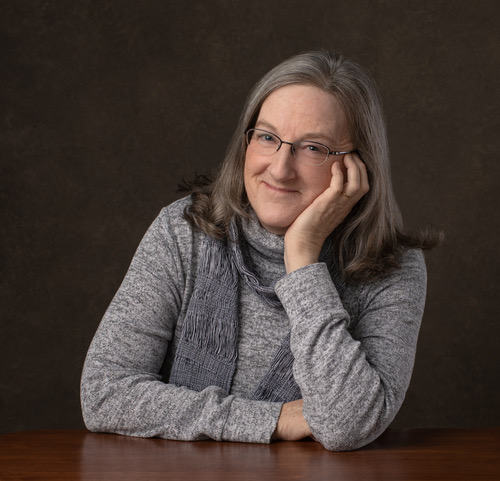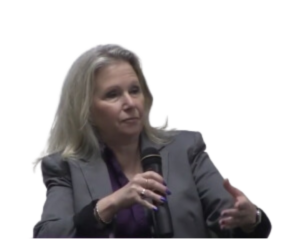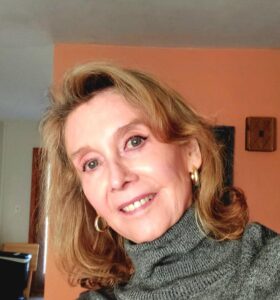Meet Helen Frost
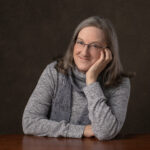 Helen Frost writes for children, teens, and adults. Her books include novels-in-poems for middle school and young adult readers (All He Knew, When My Sister Started Kissing, Applesauce Weather, Salt, Blue Daisy, Hidden, Crossing Stones, Diamond Willow, The Braid, Room 214, Keesha’s House), picture books (Monarch and Milkweed, The Mighty Pollinators—and six other collaborations with photographer Rick Lieder), poetry collections (as if a dry wind; Skin of a Fish, Bones of a Bird), as well as anthologies, plays, and a book about teaching writing. She has worked extensively with children and teens, often in collaboration with other artists. Her awards include a National Endowment for the Arts fellowship in poetry, the Scott O’Dell award for historical fiction for children, and an Indiana Author Award. She lives in Fort Wayne, Indiana.
Helen Frost writes for children, teens, and adults. Her books include novels-in-poems for middle school and young adult readers (All He Knew, When My Sister Started Kissing, Applesauce Weather, Salt, Blue Daisy, Hidden, Crossing Stones, Diamond Willow, The Braid, Room 214, Keesha’s House), picture books (Monarch and Milkweed, The Mighty Pollinators—and six other collaborations with photographer Rick Lieder), poetry collections (as if a dry wind; Skin of a Fish, Bones of a Bird), as well as anthologies, plays, and a book about teaching writing. She has worked extensively with children and teens, often in collaboration with other artists. Her awards include a National Endowment for the Arts fellowship in poetry, the Scott O’Dell award for historical fiction for children, and an Indiana Author Award. She lives in Fort Wayne, Indiana.
(head shot credit Tim Andersen)
Helen will be teaching “From Board Books to Young Adult Literature: an overview of writing for children” and “How Do You Know These Kids?”: Getting the Voices Right in Young Adult Fiction” and participating in the panel, “Writing Across Genres.” She is also a member of the Manuscript Evaluation team.
Check out the Full Faculty and the Conference Schedule…
…then visit our Registration Page!
Q&A with Helen
Helen Frost ‘s expertise and experience make her an excellent addition to our faculty team! I’m excited to hear all of the things attendees learn from her sessions–and I highly recommend checking out her books!
MWW: You’re giving a session on “Getting the Voices Right in Young Adult Fiction.” What’s the most difficult thing about writing characters that are entirely unlike you, perhaps from a different gender, class, or race—or period of history? How do you overcome these challenges?
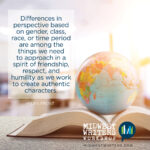 HF: I’ve never written a character who is entirely unlike myself, and have never met a real-life person who is. But those differences in perspective that you mention in your question are among the many things that are important to understand as we work to create authentic characters. I approach all of this in a spirit of friendship and humility. Differences in perspective—based on things like gender, class, race, era—are among the many things that are important to understand as we work to create authentic characters.
HF: I’ve never written a character who is entirely unlike myself, and have never met a real-life person who is. But those differences in perspective that you mention in your question are among the many things that are important to understand as we work to create authentic characters. I approach all of this in a spirit of friendship and humility. Differences in perspective—based on things like gender, class, race, era—are among the many things that are important to understand as we work to create authentic characters.
MWW: What are some of the themes, values, or messages you find that you tend to incorporate into your stories for young audiences? Do you set out to do so, or do they emerge as the story takes shape?
HF: I value kindness and connection and taking care of the earth. These emerge as my stories take shape.
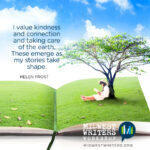 MWW: How do you tailor your writing style for different age groups, and how do you make choices about what topics you can address with different age groups?
MWW: How do you tailor your writing style for different age groups, and how do you make choices about what topics you can address with different age groups?
HF: I think about people I know and love, of all different ages, and try to write in such a way that readers will hear what they are ready to hear and not be troubled by things that are beyond their understanding or experience.
MWW: What are some books on craft you’d recommend to our attendees?
HF: I’ll suggest a few books on poetic form that might be helpful.:
All He Knew, middle grade (grades 3-7 or so) novel-in-verse.
Blue Daisy, novel in verse for grades 1-4 or so.
The Mighty Pollinators, picture book collaboration with photographer Rick Lieder.
|
|
ADVERTISE WITH US!
This ad space could be yours! MWW publishes four digital newsletters a month. With over 3,000 subscribers and a 42+% open rate, we offer an excellent venue for reaching your target audience.
Check out our advertising opportunities.
SEE WHAT ELSE MWW HAS TO OFFER
- MWW Writing Services: Receive manuscript evaluations from our experts
- Midwest Writers Workshop Facebook Group: Join our community to network, support, celebrate, and commiserate with other writers

